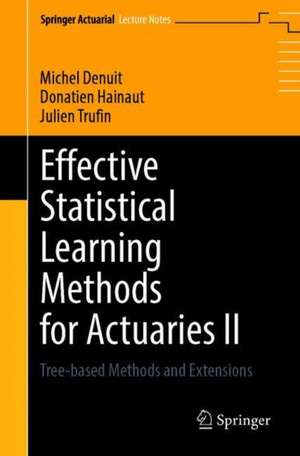Effective Statistical Learning Methods for Actuaries II: Tree-Based Methods and Extensions: Springer Actuarial
Autor Michel Denuit, Donatien Hainaut, Julien Trufinen Limba Engleză Paperback – 17 noi 2020
The exposition alternates between methodological aspects and numerical illustrations or case studies. All numerical illustrations are performed with the R statistical software. The technical prerequisites are kept at a reasonable level in order to reach a broad readership. In particular, master's students in actuarial sciences and actuaries wishing to update their skills in machine learning will find the book useful.
This is the second of three volumes entitled Effective Statistical Learning Methods for Actuaries. Written by actuaries for actuaries, this series offers a comprehensive overview of insurancedata analytics with applications to P&C, life and health insurance.
Preț: 389.70 lei
Nou
Puncte Express: 585
Preț estimativ în valută:
74.57€ • 78.06$ • 61.70£
74.57€ • 78.06$ • 61.70£
Carte tipărită la comandă
Livrare economică 05-19 aprilie
Preluare comenzi: 021 569.72.76
Specificații
ISBN-13: 9783030575557
ISBN-10: 3030575551
Pagini: 228
Ilustrații: X, 228 p. 68 illus., 6 illus. in color.
Dimensiuni: 155 x 235 x 18 mm
Greutate: 0.45 kg
Ediția:1st ed. 2020
Editura: Springer International Publishing
Colecția Springer
Seriile Springer Actuarial, Springer Actuarial Lecture Notes
Locul publicării:Cham, Switzerland
ISBN-10: 3030575551
Pagini: 228
Ilustrații: X, 228 p. 68 illus., 6 illus. in color.
Dimensiuni: 155 x 235 x 18 mm
Greutate: 0.45 kg
Ediția:1st ed. 2020
Editura: Springer International Publishing
Colecția Springer
Seriile Springer Actuarial, Springer Actuarial Lecture Notes
Locul publicării:Cham, Switzerland
Cuprins
Chapter 1: Introductio.- Chapter 2 : Performance Evaluation.- Chapter 3 Regression Trees.- Chapter 4 Bagging Trees and Random Forests.- Chapter 5 Boosting Trees.- Chapter 6 Other Measures for Model Comparison.
Notă biografică
Michel Denuit holds masters degrees in mathematics and actuarial science as well as a PhD in statistics from ULB (Brussels). Since 1999, he has been professor of actuarial mathematics at UCLouvain (Louvain-la-Neuve, Belgium), where he serves as Director of the masters program in Actuarial Science. He has also held several visiting appointments, including at Lausanne (Switzerland) and Lyon (France). He has published extensively and has conducted many R&D projects with major (re)insurance companies over the past 20 years.
Donatien Hainaut is a civil engineer in applied mathematics and an actuary. He also holds a masters in financial risk management and a PhD in actuarial science from UCLouvain (Louvain-La-Neuve, Belgium). After a few years in the financial industry, he joined Rennes School of Business (France) and was visiting lecturer at ENSAE (Paris, France). Since 2016, he has been professor at UCLouvain, in the Institute of Statistics, Biostatistics and Actuarial Science. He serves as Director of the UCLouvain Masters in Data Science.
Textul de pe ultima copertă
This book summarizes the state of the art in tree-based methods for insurance: regression trees, random forests and boosting methods. It also exhibits the tools which make it possible to assess the predictive performance of tree-based models. Actuaries need these advanced analytical tools to turn the massive data sets now at their disposal into opportunities.
The exposition alternates between methodological aspects and numerical illustrations or case studies. All numerical illustrations are performed with the R statistical software. The technical prerequisites are kept at a reasonable level in order to reach a broad readership. In particular, masters students in actuarial sciences and actuaries wishing to update their skills in machine learning will find the book useful.
This is the second of three volumes entitled Effective Statistical Learning Methods for Actuaries. Written by actuaries for actuaries, this series offers a comprehensive overview of insurance data analytics with applications to P&C, life and health insurance.
The exposition alternates between methodological aspects and numerical illustrations or case studies. All numerical illustrations are performed with the R statistical software. The technical prerequisites are kept at a reasonable level in order to reach a broad readership. In particular, masters students in actuarial sciences and actuaries wishing to update their skills in machine learning will find the book useful.
This is the second of three volumes entitled Effective Statistical Learning Methods for Actuaries. Written by actuaries for actuaries, this series offers a comprehensive overview of insurance data analytics with applications to P&C, life and health insurance.
Caracteristici
Provides an exhaustive and self-contained presentation of tree-based methods applied to insurance Gives a rigorous statistical analysis of tree-based methods Fills a gap in the literature on artificial intelligence techniques applied to insurance Written by actuaries for actuaries Based on more than a decade of lectures and consulting projects on the topic, by the three authors Offers several case studies in P&C insurance












